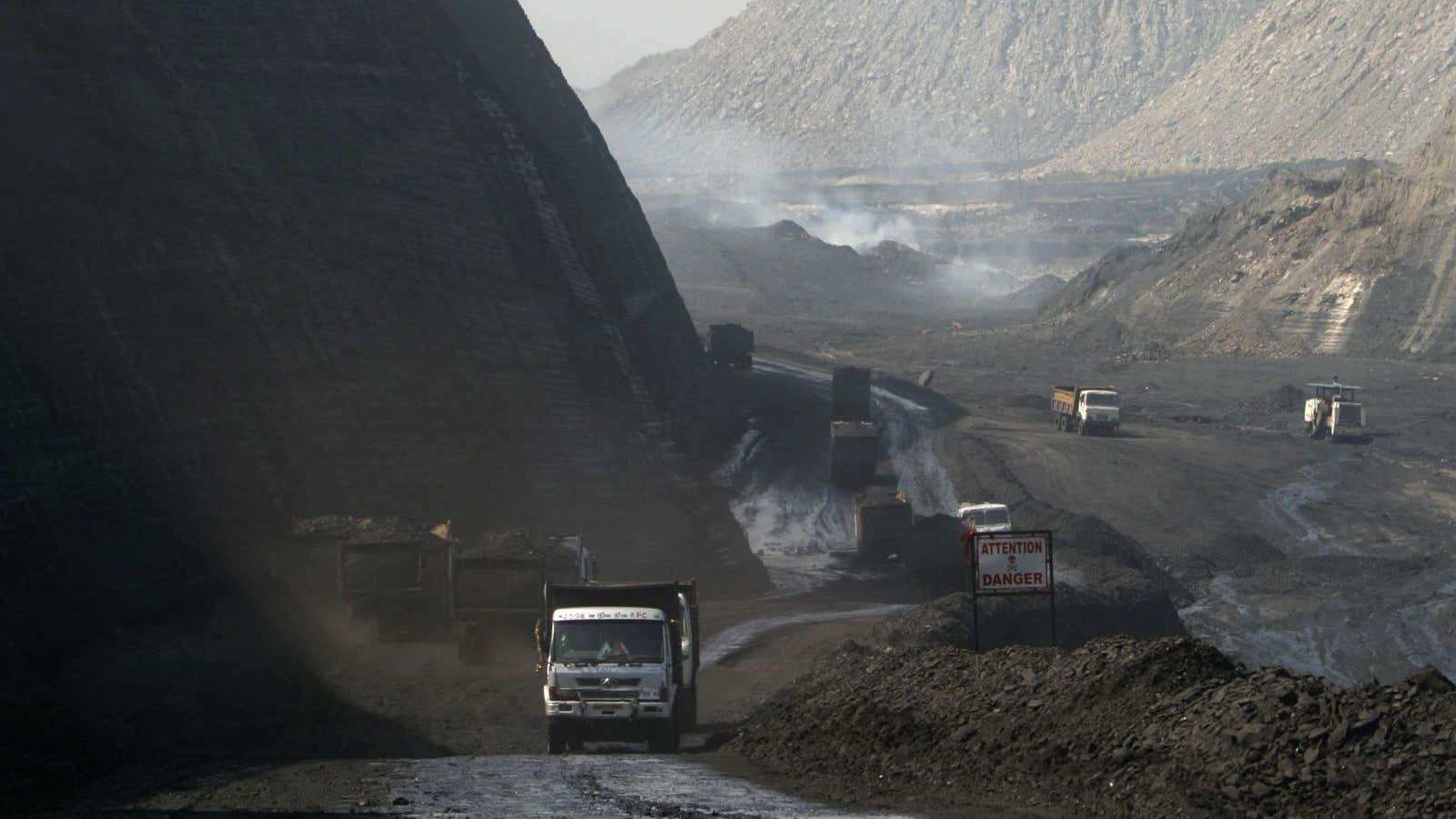Finance minister Arun Jaitley has stirred up country’s policy circles by hinting at the possible privatization of India’s critical coal industry, which has remained under state control for four decades.
But he has since been mounting caveat after caveat, raising doubts about whether it might end up being just an expression of intent.
Here is what Jaitley said in the press conference after the Narendra Modi’s cabinet met: ”Coal India will continue to function as it is, and all the mining requirements of Coal India—present and future—will be adequately protected.”
“There will also be an enabling provision for the future, where under rules which are framed, commercial users of mines in future, could also be decided by the central government,” the finance minister added.
In a television interview before the cabinet meeting, Jaitley had also alluded to the idea of allowing private miners into India’s coal sector.
“It’s not necessary for us to touch Coal India. It’s a monolith, it’s been serving the country well,” he told ET Now. “But there is a lot of investment which is waiting. There are people who are actual users who need mining. There are people who are experts in mining, and therefore they can create a surplus as far as this country is concerned.”
On Tuesday, he told NDTV that “there is space for creating competition” in the coal sector, though Coal India—which produces about 80% of India’s coal—will keep its place.
Powerful unions
There’s a simple reason why Jaitley has been stressing on protecting Coal India, while talking of opening up the sector: This isn’t the first time that a government has tried to allow private miners in—and previous attempts have been stalled by powerful trade unions that no party wants to antagonize.
An amendment in the Coal Mines (Nationalisation) Act—that would allow Indian companies to dig for coal without the restrictions of captive mining—has been stuck in Parliament for 14 years now, and has made next to no headway because unions have stood staunchly against it.
Between 1971 and 1973, India’s coal mines were nationalized to “provide adequate investments in coal mines, conserve coal resources, ensure mines safety and environmental protection and to assure decent living standards for coal labour,” according to the 2000 amendment.
After Jaitley’s comments, unions representing 90% of Coal India’s workforce have reportedly threatened to strike if any denationalization is pushed through. They suspect that the Modi government has plans for “backdoor” privatization of the coal sector. At a time when the government wants to divest its stake in the mining company, widespread labour trouble isn’t going to be attractive to investors.
Quality matters
But there are other problems. About half of India’s coal reserves—the fifth largest in the world—that is available above 600 meters is low-quality coal, former Coal India chairman S. Narsing Rao pointed out in 2012. “If the private sector, including multinational corporations, is allowed to mine coal for commercial purposes, it will probably stick to producing from areas that have a low cost of production and high quality of coal,” he argued.
Since Jaitley wants to safeguard Coal India, it can’t exactly allow private firms into these lucrative coal assets and ask the state-run miner to look elsewhere.
Much of India’s unexploited coal reserves lie in remote areas with inadequate transportation infrastructure. If private firms are asked to look at these assets, they will be forced to build expensive infrastructure to extract coal from these mines. This new transport infrastructure will then have to be linked with existing railway routes—that already moves about half of India’s coal—for further movement. Coordination between Coal India and the railways is already problematic, so adding private miners in the mix won’t make things any better.
Moreover, with Coal India selling coal at a subsidized price, it’s unclear how private firms will recover these large investments since pricing their coal according to international benchmarks will drive up cost for customers—primarily power, steel and cement sectors—who will then want to pass on the cost to the end-consumer. Industry is unlikely to react happily. And if the government forces miners to keep their prices low, private players can’t be expected to queue up.
In short, opening up the sector to private miners while fully safeguarding Coal India’s interests, is going to be a tightrope walk.
“In the current situation, it’s not right to get merchant miners into the sector,” an analyst told Quartz, requesting anonymity since the details of the policy aren’t public yet, “Till Coal India’s share (of the market) goes down, it is not possible in the next few years.” And reducing dependence on Coal India would primarily happen through an increase in captive mining.
That may be exactly what finance minister Jaitley intends on doing by streamlining the coal auction process—and by refusing to give a clear timeline on allowing private players. But that’s not stopping the excitement about denationalization of India’s coal sector.
